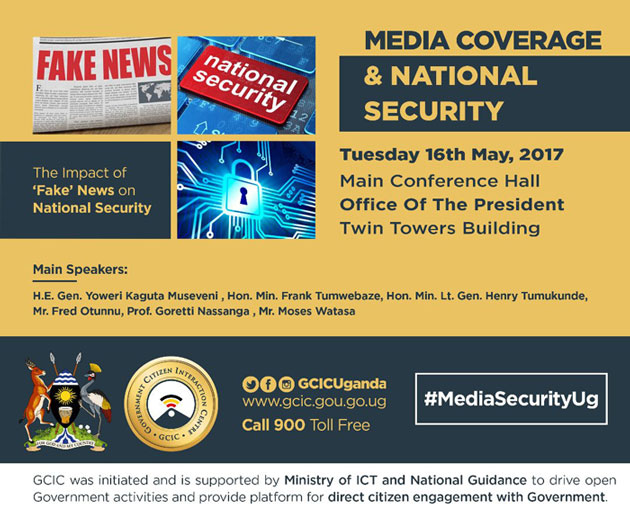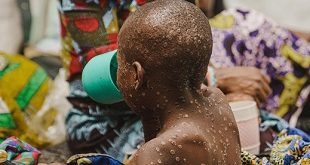
President Yoweri Museveni will on Tuesday make a presentation on the impact of fake news at a one-day interactive session on “Media Coverage and National Security in Uganda”.
The dialogue organised by the Ministry of Security, will also have the ICT minister Frank Tumwebaze, Security Minister Lt. Gen. Henry Tumukunde, academics, media owners and Uganda Communications Commission officials make presentations.
Arguments related to press freedom, coverage limits and “fake news”, have come to the fore in the past few months, and even reached court after the murder of Police spokesman AIGP Andrew Kaweesi.
The past few months have also seen clashes on the role of the media in parliament, during the elections and lately the police, which climaxed with the Inspector General of Police Gen Kale Kayihura getting court to restrain journalists from covering the investigations into the murder of Kaweesi.
Police argued that the press reports are jeopardizing the murder investigations.
Through the Attorney General, Kayihura got an injunction against the publication of the stories on Kaweesi by the Red Pepper, The Investigator, Chimp Reports among others.
His argument was that the defendants published confidential information relating to the said investigation of the late senior police officer and the security of Uganda without permission from Police.
Relatedly, constant attacks on journalists by security operatives have seen Uganda drop by 10 places in the just released 2017 World Press Freedom Index.
Uganda stands at 112, down from 102 it occupied last year with an index score of 35.94. The attacks on journalists shot up before and after the 2016 presidential election.
Trump and fake news
Fake news is described online as a type of yellow journalism that consists of deliberate misinformation or hoaxes spread via the traditional print, broadcasting news media, or via Internet-based social media.
Fake news is written and published with the intent to mislead in order to gain financially or politically, often with sensationalist, exaggerated, or patently false headlines that grab attention.
The term has been popularized by new US President Donald Trump, who has constantly attacked the press that does not favour him as ‘Fake News’.
TUESDAY TENTATIVE PROGRAM
Event and Theme: Media Coverage and National Security in Uganda
VENUE: MAIN CONFERENCE HALL
(OFFICE OF THE PRESIDENT TWIN TOWERS BUILDING)
DATE: Tuesday 16th May, 2017
……………………………………………………………………………………..
TIME ACTIVITIES
08:00 am – 08:50 am Guest Arrival and Registration
09:00 am – 09:30 am Official Opening: Hon. Min. Frank Tumwebaze Min. ICT&NG
Presentation: State of the Media in Uganda
09:30 am – 09:45 am Mr. Moses Watasa, – Comm. Info – Min. ICT & NG
Presentation: State of ICT and the Media in Uganda
09:45 am – 10:00 am Mr. Kin Karisa, CEO – NBS TV and Chairperson National Association of Broadcasters (Uganda)
Presentation: Coexistence of Media Freedom & National Security in Uganda
10:00 am – 10:30am Prof. Goretti Nassanga, Mak. Uni. Journalism & Mass Comm
Presentation: Media Coverage and National Security
10:30 am – 11:00 am Mr. Fred Otunnu Director Corporate Affairs – UCC
Presentation: Regulation in the Converged Digital Era
11:00 am – 11:30 am Audience Discussions/Tea break
11:30 am – 12:00 am Hon. Min. Lt. Gen. Henry Tumukunde, Minister for Security
Presentation: Effect of Media Leaks on National Security
12:00 am – 01:00 pm Arrival of Chief Guest, H.E. Gen. Yoweri Kaguta Museveni
Presentation: Impact of ‘Fake’ News on National Security
01:00 pm Closing of function, Group Photo, Lunch
@KagutaMuseveni will tomorrow speak at the Media-Security about the role of media in promoting national security #MediaSecurityUG pic.twitter.com/VgYhGfDreX
— GCIC Uganda (@GCICUganda) May 15, 2017
 The Independent Uganda: You get the Truth we Pay the Price
The Independent Uganda: You get the Truth we Pay the Price



